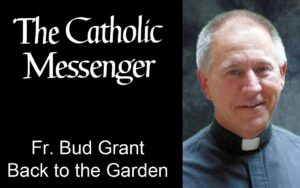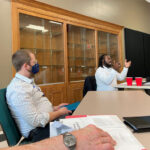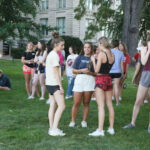By Father Bud Grant
Armed with coffee and (metaphorical) red pen to grade the final assignments of my “Just Theology” students, I pause to evaluate what we have learned from the pilot semester of this new course offering. Our faculty explicitly intended to reinforce how our diocesan university links theology and justice. So how did we do?
 First, the course is timely. With every new wave of injustice or new ethical threat that rippled across our country this summer I changed my focus. I am firmly committed to focus only on immigration … no, we have to deal with racism…ah, it’s gotta be on gun violence … shoot, we have to talk about right to life issues. But environmental crises constitute an existential threat to humanity … but there’s the issues concerning women, health care, LBGTQ, social media, artificial intelligence, augmented and virtual reality, war, civil discourse!
First, the course is timely. With every new wave of injustice or new ethical threat that rippled across our country this summer I changed my focus. I am firmly committed to focus only on immigration … no, we have to deal with racism…ah, it’s gotta be on gun violence … shoot, we have to talk about right to life issues. But environmental crises constitute an existential threat to humanity … but there’s the issues concerning women, health care, LBGTQ, social media, artificial intelligence, augmented and virtual reality, war, civil discourse!
I decided to think about whom we are teaching. Our students are new to college. They are overwhelmingly white, a few more women than men. Few from outside the Midwest. Many have been trained-to-the-test. About half are unchurched. Generally, they are not tuned in to social justice issues. Their opinions are shaped more by passive assimilation and uncritical assumptions than facts and reflection. More importantly, they need tools: theological methodologies, interpreting the Scriptures, reading difficult texts, evaluating truth claims, knowing what the church teaches and how others reflect on those teachings.
Since all justice issues require applications of theological thinking, we started with the primary principles. Using the parable of the Good Samaritan, we discussed the “common good.” Cicero and Ambrose helped us tease out the subtle relationship between the common good and individual rights/responsibilities. Augustine laid out the tension between grace and free will. Thomas Aquinas grounded us in natural law and virtues ethics, essential for understanding Catholic Intellectual Tradition. We examined theological methodologies. Combined, these sources were supposed to give my students a grounding in the “primary principles” that govern the church’s responses to justice issues.
With it, we reviewed the long and impressive legacy of the “Catholic Social Teachings” that began in 1891 with Pope Leo XIII’s “Rerum Novarum” and continues through Pope Francis’ “Gaudete et Exultatae” (2018). From these I hoped that the students would see how the church models the use of Scripture, natural law and theological methods to address issues such as free association (unions), war, racism, poverty, migration, care for the earth and so on. Students picked up the distinct vocabulary of the encyclicals: solidarity, subsidiarity, common good, human rights…
Studies culminated with group projects. Each group was assigned a church teaching and an alternative response to a specific social issue. They studied an outside source that addressed that same issue (preferably from their own major). They presented their work orally, including their own critique. For example, one group read the “Instruction on Certain Aspects of the Theology of Liberation” by the Congregation for the Doctrine of the Faith (which could learn how to draft more appealing titles), then Gustavo Guiterrez’ “Notes for a Theology of Liberation” or Nicole Flores’ “Toward a Vision of Justice in Latina Theology.” Another group member critiqued a business perspective arguing that individuals, not the government, should help migrants. It was a lively discussion.
Now, as I read their journals, I see evidence that students have learned Just Theology. They know that faith and reason are tandem tools in discerning and responding to God’s invitation to relationship. They see that we are still working out the implications of the Gospel … who IS included in the “Common Good?” They know how to apply primary principles of the Catholic Intellectual Tradition to any specific issue to arrive at reasonable, compelling and always tentative conclusions. They don’t all agree on solutions but their consciousness of the urgency of the issues is heightened and their critical skills empower them. It was a good start. I’d give us an A.
(Father Bud Grant is a professor of theology at St. Ambrose University in Davenport.)












nice article it is very helpful